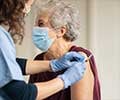- Liang J, Wallace G, Mootrey G. Licensure of a diphtheria and tetanus toxoids and acellular pertussis adsorbed and inactivated poliovirus vaccine and guidance for use as a booster dose. Centers for Disease Control and Prevention (CDC): Advisory Committee on Immunization Practices (ACIP), 2015. MMWR 2015; 64(34): 948-9.
- Lee HJ, Choi JH. Tetanus-diphtheria-acellular pertussis vaccination for adults: an update. Clin Exp Vaccine Res. 2017 Jan; 6(1): 22-30. doi: 10.7774/cevr.2017.6.1.22 . PMID: 28168170.
- Ansaldi F, Trucchi C, Alicino C, Paganino C, Orsi A, Icardi G. Real-world effectiveness and safety of a live-attenuated herpes zoster vaccine: a comprehensive review. Adv Ther. 2016 Jul; 33(7): 1094-104. doi: 10.1007/s12325-016-0355-0 . PMID: 27262452.
- Aggarwal R, Goel A. Hepatitis A: epidemiology in resource-poor countries. Curr Opin Infect Dis. 2015 Oct; 28(5): 488-96. doi: 10.1097/QCO.0000000000000188 . PMID: 26203853.
- Tajiri K, Shimizu Y. Unsolved problems and future perspectives of hepatitis B virus vaccination. World J Gastroenterol. 2015 Jun 21; 21(23): 7074-83. doi: 10.3748/wjg.v21.i23.7074 . PMID: 26109794.
- Falkenhorst G, Remschmidt C, Harder T, Hummers-Pradier E, Wichmann O, Bogdan C. Effectiveness of the 23-valent pneumococcal polysaccharide vaccine (PPV23) against pneumococcal disease in the elderly: systematic review and meta-analysis.
- Centers for Disease Control and Prevention (CDC): Meningococcal vaccination - (https://www.cdc.gov/vaccines/vpd/mening/index.html)
- Centers for Disease Control and Prevention (CDC): Recommended immunization schedule for adults aged 19 years or older, by vaccine and age group, 2017 - (https://www.cdc.gov/vaccines/schedules/hcp/imz/adult.html)
- Malaria Vaccine Initiative (MVI): RTS,S - (http://www.malariavaccine.org/malaria-and-vaccines/first-generation-vaccine/rtss)
Adult Immunization
There are millions of people across the globe suffering from or have died due to vaccine-preventable diseases. We generally assume that the vaccinations we receive as children are enough to safeguard us throughout life. Contrary to this belief, our need for immunization does not stop with childhood. A few of the reasons are given below:
- Many adults have never been administered vaccines during childhood.
- Some of the vaccines available now were not available a few years ago.
- It is also established that immunity reduces as a person grows old.
Childhood immunization is done very early and some of its effects are likely to wear-off, leaving individuals at risk for newer and different diseases. Regardless of age, we need immunization against a whole gamut of vaccine-preventable diseases to maintain good health and lead a disease-free life.
Factors that Determine Adult Immunization
Each country has its own guidelines regarding immunization in adults. An adult’s need for immunization is very specific and are determined by certain factors. These include the following:
- Age
- Health condition
- Previous immunization status
- Lifestyle
- Occupation
- Areas / locations where travel is to be undertaken
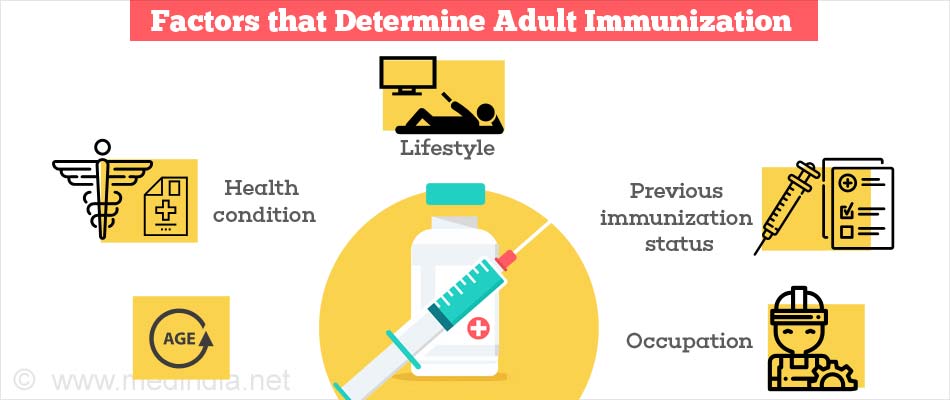
Diseases and Adult Immunization
Tetanus, Diphtheria and Whooping Cough: Tetanus is a serious infection that causes painful tightening of muscles. The disease is commonly known as “lockjaw”, where a person is unable to open the mouth, swallow or breathe. It is caused by the bacterium Clostridium tetani, which produces a toxin that affects the brain and nervous system, leading to stiffness of the muscles. It is transmitted through cuts or wounds.
Diphtheria is a serious respiratory infection caused by the bacterium Corynebacterium diphtheriae. The infection generally affects the mucous membranes of the nose and throat.
Whooping cough or pertussis is an extremely contagious respiratory tract infection that is caused by the bacterium Bordetella pertussis. Living with whooping cough can be traumatic as it involves periods of fitful coughing, difficulty in breathing, choking and difficulty in doing everyday chores. The condition can be quite severe for both babies and adults.
Tetanus, diphtheria and whooping cough infections can be prevented by administering the vaccine Tdap to an adult who has not been administered vaccines for these conditions earlier. Tdap is commercially available as Adacel® (Sanofi) and Boostrix® (GlaxoSmithKline). The CDC recommends the Tdap vaccine once in individuals who have not received the vaccine beyond the age of 11 years. The primary series should be 3 doses of Td [commercially available as Tenivac® (Sanofi)] given at least 1 month apart; of this, one dose should be replaced by Tdap. Subsequently, Td boosters should be given every 10 years.
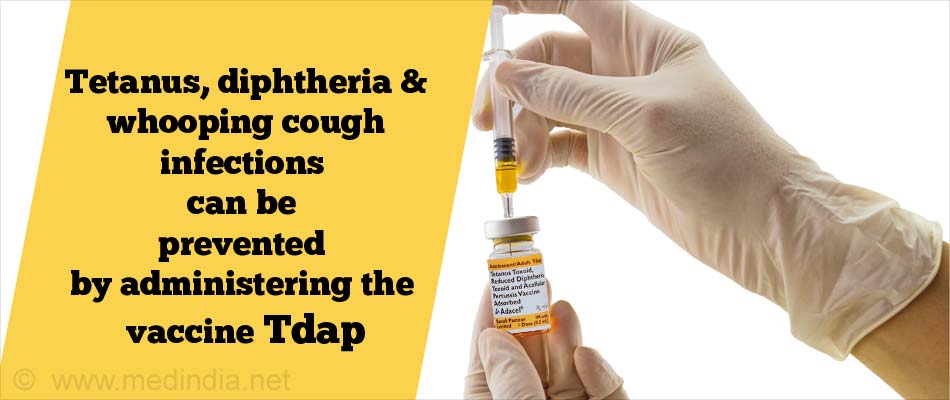
Seasonal Influenza: Influenza, commonly known as flu, is a respiratory viral infection characterized by chills, runny nose, headache, body pain, fatigue and fever. It is caused by the viruses Influenza A and B. It is mostly seasonal and can cause complications especially in the elderly. All adults can be protected against the flu virus by taking the flu vaccine. Immunization can be carried out either with a trivalent inactivated vaccine (TIV) or a live-attenuated influenza vaccine (LAIV). Both LAIV and TIV contain strains of influenza viruses that are antigenically equivalent to the annually circulating strains as per the World Health Organization (WHO) recommendations. Of the two types of influenza vaccines discussed above, your health care provider will decide on the correct one that you should take.
Influenza vaccines are available commercially as Fluarix Quadrivalent® (GlaxoSmithKline) and Fluzone Quadrivalent® (Sanofi Pasteur). Annual vaccination against influenza is recommended for adults wanting to reduce the risk of coming down with the flu or of transmitting it to others. Moreover, for adults who are either at high risk of complications arising from flu, or are close contacts of persons at higher risk, should also be vaccinated. The vaccine has to be repeated every year.
Chickenpox: Chickenpox, also known as varicella, is a highly contagious viral infection, which causes an itchy, blister-like rash on the skin. It is caused by the varicella zoster virus (VZV). The infection can be more severe in adults than in children. Chickenpox can be prevented by vaccination. The varicella vaccine is a live-attenuated vaccine, which is commercially available as Varivax® (Merck). The chickenpox vaccine is a two-dose vaccine that is administered to adults who have not received it earlier or who have not suffered from the infection during their childhood.
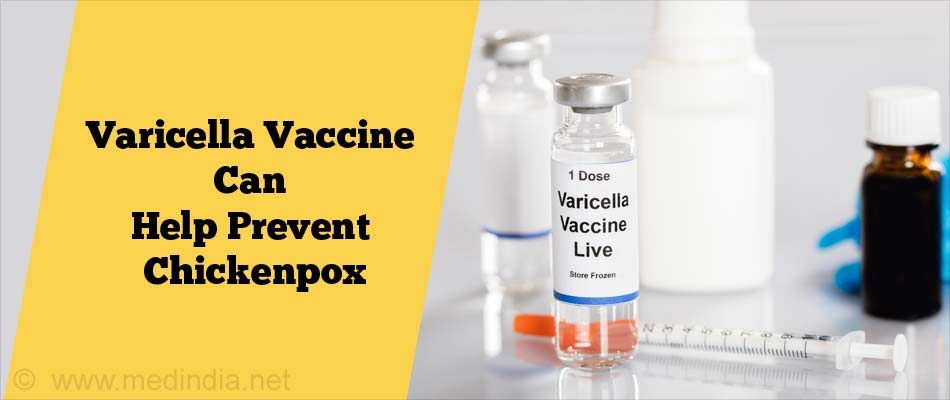
Shingles: Shingles, also known as herpes zoster, is an infection characterized by skin rashes, headaches, chills, and fever and is brought about by the same virus which causes chickenpox. Shingles can cause loss of eye sight if the virus attacks the eye. Herpes zoster vaccine is available commercially as Zostavax® (Merck) and is licensed by the US Food and Drug Administration (USFDA) for all adults, 60 years and older. People with a past episode of herpes zoster also can receive the vaccine to help prevent future occurrences of the disease.
Meningococcal Disease: Bacterial meningitis is caused by the meningococcus, Neisseria meningitidis. The pathogen causes infection of the brain and spinal cord, which can be prevented in adults through meningococcal vaccination. The vaccine may be administered to adults who are at high risk for the infection. Currently, there are three meningococcal vaccines that are available.
- Meningococcal Conjugate Vaccines: These include Menactra®(Sanofi Pasteur), Menveo®(GlaxoSmithKline) and MenHibrix®(GlaxoSmithKline).
- Meningococcal Polysaccharide Vaccine: This is available commercially as Menomune®(Sanofi Pasteur). However, this vaccine has been discontinued from February, 2017.
- Serogroup B Meningococcal Vaccines: These are available commercially as Bexsero® (GlaxoSmithKline) and Trumenba® (Pfizer).
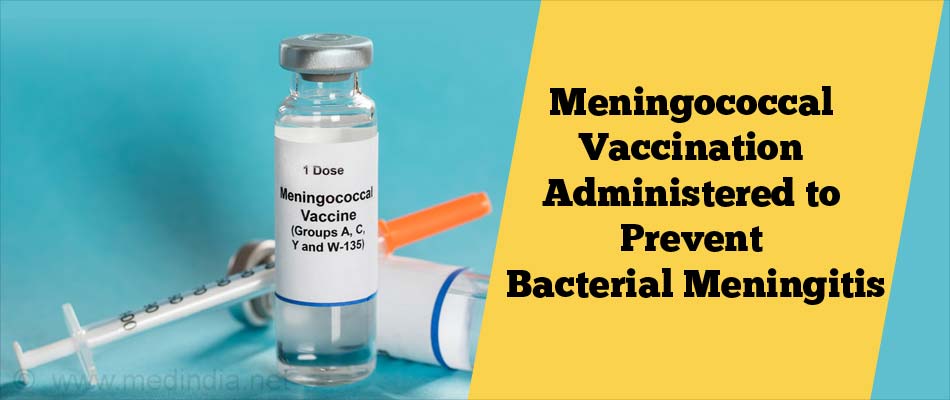
Hepatitis A and B: Hepatitis is a condition involving inflammation of the liver. It is brought about by Hepatitis A and B viruses (HAV and HBV). Hepatitis A is spread through food contamination while hepatitis B is spread most commonly from mother to child at birth (perinatal transmission), and through contact with infected blood products, unsafe sex with infected partner(s), and using infected needles in healthcare settings and among drug users. The symptoms of hepatitis include fever, fatigue, loss of appetite and nausea, abdominal discomfort, dark urine, and yellowing of the skin and the white of the eyes. Adults may be protected against these viral hepatitis infections by being vaccinated against Hepatitis A and B viruses if they did not receive the vaccines as children.
Currently, two vaccines are available for Hepatitis A. These include Havrix® (GlaxoSmithKline) and Vaqta® (Merck), both of which are two-dose vaccines. The first dose is followed by the second dose between 6-18 months.
Similarly, there are two hepatitis B vaccines that are currently available, both of which are made by recombinant DNA technology or “Genetic Engineering”. Both vaccines are based on the recombinant hepatitis B surface antigen (HBsAg or Australia antigen) protein, which is commercially called Recombivax HB® (Merck) and Engerix-B® (GlaxoSmithKline). These are three-dose vaccines and are administered at 0, 1 and 6 months.
Rubella: Rubella is also known as German measles. The infection is caused by the rubella virus and is generally a mild infection. The infection occurs most often in children and young adults and is characterized by fever, sore throat, rash, headache, and red, itchy eyes. In pregnant women, rubella infection can cause fetal death or congenital defects in their children. It can be prevented with the help of the Measles-Mumps-Rubella (MMR) vaccine, which is commercially available as M-M-R® II (Merck). The CDC recommends that adults born in 1957 or later without acceptable evidence of immunity to measles, mumps, or rubella should receive 1 dose of the MMR vaccine unless they have a medical contraindication to the vaccine, e.g., pregnancy or severe immunodeficiency.
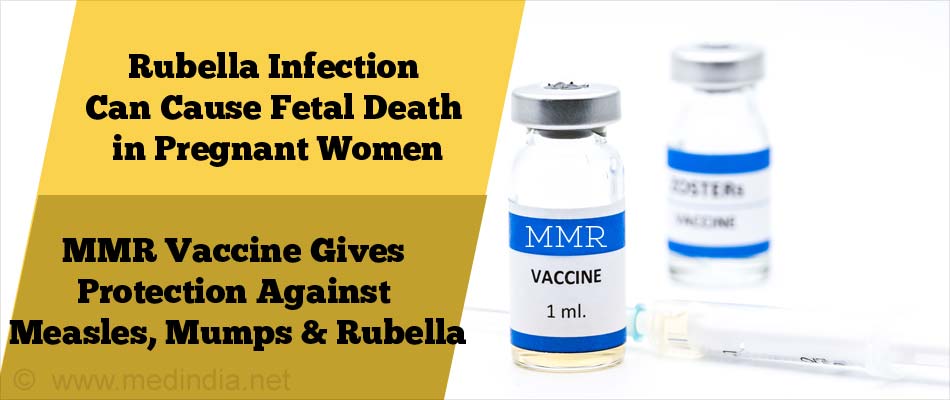
Pneumococcal Disease: Pneumococcal infections are caused by the bacterium Streptococcus pneumoniae that is responsible for pneumonia, sinus infections, ear infections, meningitis and sepsis. Adults who have lower immunity are more prone to these infections, which can be prevented through pneumococcal vaccinations. There are two vaccines currently available for pneumococcal disease – the 23-valent pneumococcal polysaccharide vaccine (PPV) and the 13-valent pneumococcal conjugate vaccine (PCV-13).
PPV contains purified capsular polysaccharide from 23 serotypes of S. pneumoniae and is recommended for children above 5 years, adolescents and adults. PPV is used as a single-dose vaccine for immunizing adults and is safe, effective and well-tolerated. It is available commercially as Pneumovax 23® (Merck). The PCV-13 is available commercially as Prevnar 13® (Wyeth Pharmaceuticals Inc.) and is recommended exclusively for infants and children below 5 years.
HPV Infections: The human papillomavirus (HPV) causes cervical cancer in females and genital warts in both males and females, which can be prevented by vaccination. There are currently two safe and effective vaccines available for HPV. These are the 9-valent Gardasil®9 (Merck) and the bivalent Cervarix® (GlaxoSmithKline). As per CDC recommendations, females should be vaccinated with three-doses in the age-group 19-26 years. Males should be vaccinated with three-doses in the age-group 19-21 years.
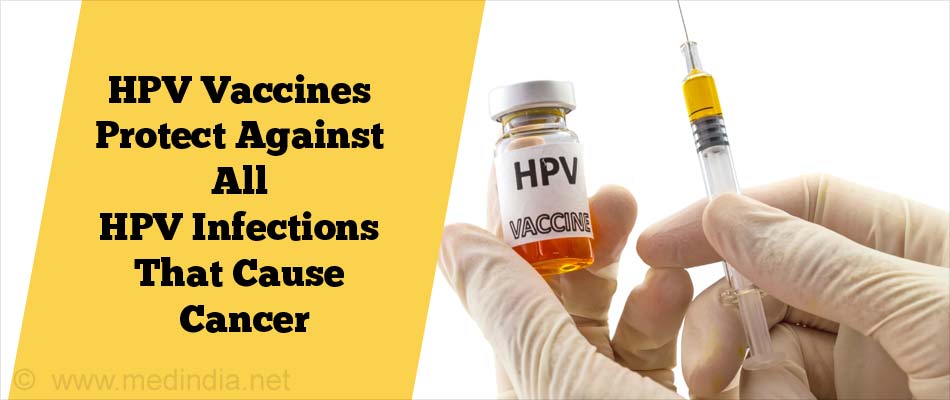
Japanese Encephalitis: Japanese encephalitis (JE), also known as “brain fever”, is caused by the Japanese encephalitis virus (JEV) and is spread by the bite of Culex mosquitoes. There are currently three JE vaccines available in India:
- JENVAC®: This vaccine is manufactured by Bharat Biotech International Ltd., a Hyderabad based company. It is an inactivated (killed) Vero-cell derived vaccine prepared from an Indian strain of JEV. It is a two-dose vaccine.
- JEEV®: This vaccine is manufactured by Biological E Ltd., based in Hyderabad. It is a purified inactivated (killed) vaccine that uses the SA 14-14-2 strain of JEV. It is a two-dose vaccine.
- SA 14-14-2: This vaccine is manufactured by the Chengdu Institute of Biological Products, China. It is a live-attenuated, single-dose vaccine. It is imported by India and used exclusively for mass vaccination campaigns by the Government of India. It is not available commercially.
Although JE vaccines are recommended for children, as per new guidelines, adults in JE endemic areas who are susceptible to JE infection, as well as people traveling to JE endemic regions can also be vaccinated.
Cholera: Cholera is a severe diarrheal disease caused by the bacterium Vibrio cholerae. The disease causes profuse watery stool (called “rice water stool”), leading to rapid dehydration, and if not treated promptly can cause death within a matter of hours. An oral cholera vaccine is available and is commercially known as Shanchol® (Sanofi). Shanchol® is indicated for active immunization against Vibrio cholerae. The vaccine can be administered to anyone above the age of 1 year.
Typhoid: Typhoid fever, also known as enteric fever, is caused by the bacterium Salmonella typhi, a highly virulent and invasive enteric pathogen. It is a major cause of morbidity and death in children and adults with a global annual incidence of 22 million cases and 200,000 deaths. Typhoid continues to be a major public health problem in developing countries like India. Typhoid can be prevented by vaccination. Three typhoid vaccines are commercially available. These include Typherix® (GlaxoSmithKline), Typbar® (Bharat Biotech), and Typhim Vi® (Sanofi Pasteur). These are recommended for active immunization of adults and children 2 years of age and older for protection against Salmonella typhi infection.
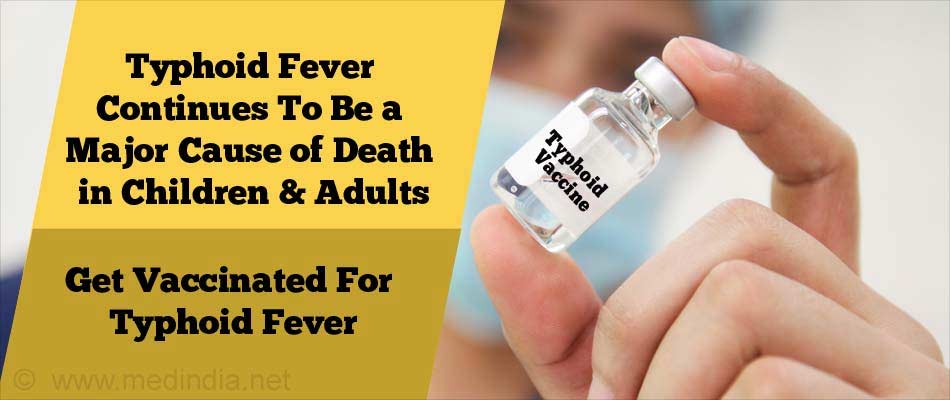
New Vaccines
There are a couple of new vaccines that are yet to be available commercially. When these become available, recommendations will be made for adult immunization. These vaccines are briefly highlighted below:
- Malaria Vaccine: Malarial disease is caused by the Plasmodium parasite that is transmitted to people through the bites of infected female Anopheles mosquitoes. Symptoms include fever, headache, and chills. The RTS,S is the most advanced malaria vaccine till date. It has been developed by PATH Malaria Vaccine Initiative (MVI) and GlaxoSmithKline (GSK) with support from the Bill and Melinda Gates Foundation (BMGF). It is a recombinant vaccine, which consists of the P. falciparum circumsporozoite protein (CSP) from the pre-erythrocytic stage of the malaria parasite life-cycle. WHO has recommended a large-scale pilot implementation of RTS,S among children aged 5 to 17 months in 3–5 settings of moderate-to-high transmission in sub-Saharan Africa.
- Dengue Vaccine: Dengue is a mosquito (Aedes aegypti)-borne viral infection characterized by high fever, severe headache, pain behind the eyes, muscle and joint pains, nausea, vomiting, swollen glands or rash. A recombinant dengue vaccine called Dengvaxia® (CYD-TVD), developed by Sanofi Pasteur has been extensively evaluated in more than 40,000 individuals in 15 different countries, including India. The Sanofi vaccine is recommended by WHO for use in individuals aged between 9 and 45 years in areas of the world where dengue is prevalent. The vaccine has been evaluated in a 3-dose schedule (0/6/12 months) in Phase III clinical trials and was first registered in Mexico in December 2015 and first commercially available in 2016 in the Philippines and Indonesia. The vaccine has since been adopted in 7 other dengue-endemic countries around the globe, namely, Brazil, Paraguay, El Salvador, Costa Rica, Peru, Guatemala, and Singapore, where more than 500,000 people have already been vaccinated with over 1.5 million doses distributed so far. The vaccine is yet to be available in India.
Conclusion
A consultation with a doctor will help you decide on the vaccinations that are required. If you are at risk for a disease because of your occupation or if you are traveling to a region that is endemic for a particular infectious disease, you may need to talk to your doctor about it and get vaccinated accordingly.
As responsible adults, it is our responsibility to live a healthy life and to make sure that our family and loved ones are disease-free. Let us make it our duty to remind our near and dear ones, our colleagues and others in our community about the need to protect ourselves by getting vaccinated.


